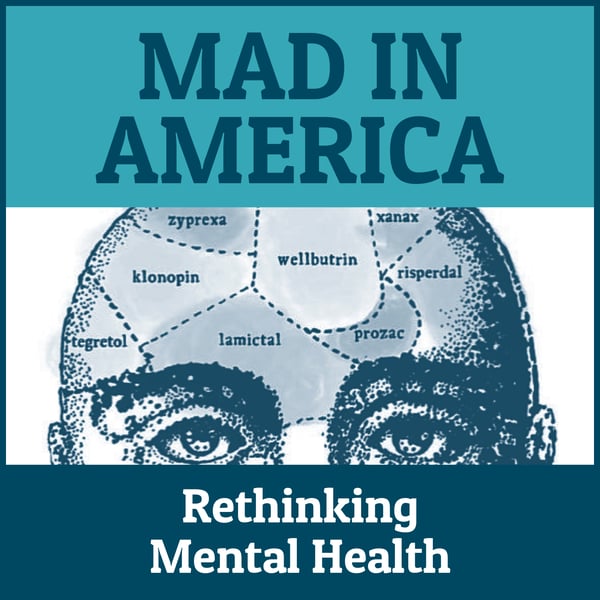David Edward Walker - Oppressive Mental Health Practices - For Native People, the Past is Present
Mad in America: Rethinking Mental Health
Mad in America
4.8 • 201 Ratings
🗓️ 7 June 2023
⏱️ 45 minutes
🧾️ Download transcript
Summary
David Edward Walker is the author of Coyote’s Swing: A Memoir and Critique of Mental Hygiene in Native America, which was published in February by Washington State University Press.
A psychologist, novelist, public speaker, poet, and singer-songwriter, Walker is a Missouri Cherokee descendent. For more than three decades he’s worked as a professor, psychotherapist, and consultant based in Washington State — including four years as a psychologist for the U.S. Indian Health Service (IHS) and, afterward, more than 20 consulting for the Confederated Tribes and Bands of the Yakama Nation.
In much of his writing, including Coyote’s Swing, he addresses the devastating impact of the Western, biomedical mental health system on Indigenous peoples — and their experiences, across the centuries, of intergenerational oppression and trauma both personal and systemic. Five years ago, Walker wrote a series of articles for Indian Country Today that zeroed in on such oppressive practices, including the harms of psychiatric treatment on Native individuals and the history of labeling Native children with “feeblemindedness” and, later, ADHD.
He holds a doctorate in clinical psychology from the University of Detroit.
***
Thank you for being with us to listen to the podcast and read our articles this year. MIA is funded entirely by reader donations. If you value MIA, please help us continue to survive and grow. To find the Mad in America podcast on your preferred podcast player, click here
Transcript
Click on a timestamp to play from that location
| 0:00.0 | Welcome to the Mad in America podcast, your source for science, psychiatry, and social justice. |
| 0:13.4 | David Edward Walker is the author of Coyote Swing, a memoir and critique of mental hygiene in Native America, which was published |
| 0:21.9 | in February by Washington State University Press. |
| 0:25.6 | A psychologist, novelist, public speaker, poet, and singer-songwriter, Walker is a Missouri |
| 0:31.7 | Cherokee descendant. |
| 0:33.8 | For more than three decades, he's worked as a professor, psychotherapist, and consultant based in Washington State, |
| 0:41.3 | including four years as a psychologist for the U.S. Indian Health Service, IHS, and afterward more than 20 years consulting for the Confederate tribes and bands of the Yakima Nation. |
| 0:55.0 | In much of his writing, including Coyote's Swing, he addresses the devastating impact |
| 1:00.0 | of the Western biomedical mental health system on indigenous peoples, and their experiences |
| 1:06.0 | across the centuries of intergenerational oppression and trauma, both personal and systemic. Five years ago, Walker |
| 1:13.4 | wrote a series of articles for Indian Country Today that zeroed in on such oppressive practices, |
| 1:18.9 | including the harms of psychiatric treatment on native individuals, and the history of labeling |
| 1:25.1 | native children with feeble-mindedness and later ADHD. |
| 1:30.1 | He holds a doctorate in clinical psychology from the University of Detroit. |
| 1:35.5 | David Walker, it is a pleasure to have you with us today. |
| 1:38.9 | Amy, I'm very glad to be here. Thanks for having me. |
| 1:41.9 | I have to say your book, Coyote Swing, there is so much packed into |
| 1:47.7 | that book. There's a ton of history, you know, colonialism, imperialism, oppression, genocide. |
| 1:54.6 | There's your personal story in there, too, stories of youths you've worked with, stories of your |
| 2:00.4 | time with IHS and the reliance on |
| 2:04.0 | the disease model, stories of your time working with the Yakima people. And this is all, |
| 2:09.1 | it all comes together. It's this really absorbing read, and you dig deep into all of that. |
... |
Please login to see the full transcript.
Disclaimer: The podcast and artwork embedded on this page are from Mad in America, and are the property of its owner and not affiliated with or endorsed by Tapesearch.
Generated transcripts are the property of Mad in America and are distributed freely under the Fair Use doctrine. Transcripts generated by Tapesearch are not guaranteed to be accurate.
Copyright © Tapesearch 2025.

